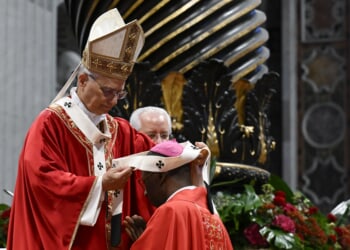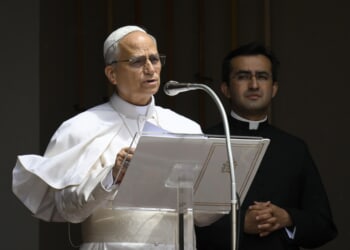This September, as world leaders gather in New York for the U.N. General Assembly, climate groups are already preparing massive street protests. Branded as the “Make Billionaires Pay” march, the event will not focus solely on fossil fuels. It will also include causes like migrant rights and gender equity, all under the banner of climate justice. If past experience is any guide, the rallies will be loud, dramatic, and more about spectacle than solutions.
That has become the trend. In London, activists once hurled tomato soup on Van Gogh’s Sunflowers. In New York, a protester glued themselves to the floor of the U.S. Open, delaying a semifinal match for nearly an hour. In 2023, demonstrators blocked roads to the Burning Man festival, creating a miles-long traffic jam in the desert until police hauled them off. These stunts did not cut a single ton of carbon emissions, but they did provide something else: a sense of belonging for a restless generation. (RELATED: Climate Activists Want to Derail the AI Revolution)
Although there has been a modest revival of faith among some young people, especially young men turning toward Christianity, Gen Z remains the least religious generation in American history. Surveys show that while small pockets are rediscovering faith or experimenting with spirituality, the broader trend is still one of religious decline and disaffiliation. That leaves many without the traditional sources of meaning and community that older generations once relied on. (RELATED: The Youngest Voters Are Trending Conservative)
At the same time that Gen Z is moving away from religion, reports on their well-being paint a troubling picture. A recent report found that nearly half of Gen Z say they feel stressed or anxious most of the time, and more than 40 percent say they experience persistent sadness or hopelessness. Financial strain and fear about the future are at the top of the list. Without the stabilizing role that faith and community once played, these struggles become even heavier, leaving many young people feeling adrift and unsure of what their lives will add up to. (RELATED: AI Chatbots Are Not the Answer to Alleviating Loneliness for Young People)
Why climate? Because it offers cosmic stakes. If the planet itself hangs in the balance, then every choice in life becomes morally charged.
Into that vacuum steps climate activism. It looks less like a policy campaign and more like a substitute faith. It has its rituals like marches, sit-ins, and slogans. It has its saints, like Greta Thunberg. And it has its central creed, which casts fossil fuels as the great evil and warns of an apocalypse that can only be avoided through devotion to the cause. (RELATED: EPA Proposes to Drive ‘A Dagger Into the Heart of the Climate Change Religion’)
Why climate? Because it offers cosmic stakes. If the planet itself hangs in the balance, then every choice in life becomes morally charged. What you eat, how you travel, even whether you should bring children into the world. For many young people, that makes climate activism not just a political issue but a source of identity.
The trouble is that this new faith often breeds despair instead of hope. A Lancet survey found that most young people now say they are extremely worried about climate change, and many feel paralyzed by the belief that humanity has only a decade left. That kind of thinking only cultivates fear and hopelessness.
And the chosen rituals are counterproductive. Soup splashed on a painting does not save the Amazon rainforest. Blocking commuters in Washington does not reduce emissions in China. These actions are closer to acts of penance than practical solutions. They are designed to demonstrate loyalty to the cause, even if they alienate the very people whose support is needed. When an activist glues himself to the floor of a stadium or clogs traffic for working families, he is not persuading anyone. He is performing devotion.
What Gen Z really needs is not more apocalyptic sermons. It is opportunity, stability, and purpose rooted in reality. If young people feel that the system is stacked against them, that they will never afford a home or build a family, then it is no wonder they cling to a movement that tells them the whole world is collapsing. But the answer is not to scold them for their hysteria. It is to give them something better to believe in.
That means building communities that welcome them. It means opening paths to careers where they can feel useful and independent. And yes, it means channeling their concern for the planet into tangible conservation efforts like cleaning waterways or restoring forests, not theatrical disruption. There is real work to be done, but it looks nothing like throwing soup at Van Gogh.
Republicans are often quick to laugh at climate panic, and sometimes it deserves a laugh. But simply dismissing it misses the point. Young people are not only protesting oil companies or Donald Trump. They are protesting the emptiness in their own lives. If that void is not addressed, the protests will only grow more extreme.
Climate activism at the United Nations General Assembly will make headlines in September. It will be framed as a fight against billionaires and fossil fuels. In reality, it will be another ritual in a new secular faith. Climate activism has become a spiritual substitute for a generation that feels lost. Until we give young people something stronger to hold on to, the rituals of despair will keep multiplying.
Iulia Lupse is the founder of I&A Communications Solutions and a contributor with Young Voices. Born in Romania, she is now based in New York. Follow her on X at @IuliaL27
READ MORE:
The Carbon Aristocracy: How the Rich Engineered the Climate Crisis — And Made You Pay for It








![Florida Man With Violent History Arrested for Choking a Cop [WATCH]](https://www.right2024.com/wp-content/uploads/2025/06/Eleven-Stabbed-in-Attack-at-Salem-Homeless-Shelter-Across-From-350x250.jpg)


![New Media Narrative on DeMS-13's Favorite Gang Banger Shredded with Video Receipts [WATCH]](https://www.right2024.com/wp-content/uploads/2025/07/New-Media-Narrative-on-DeMS-13s-Favorite-Gang-Banger-Shredded-with-350x250.jpg)





